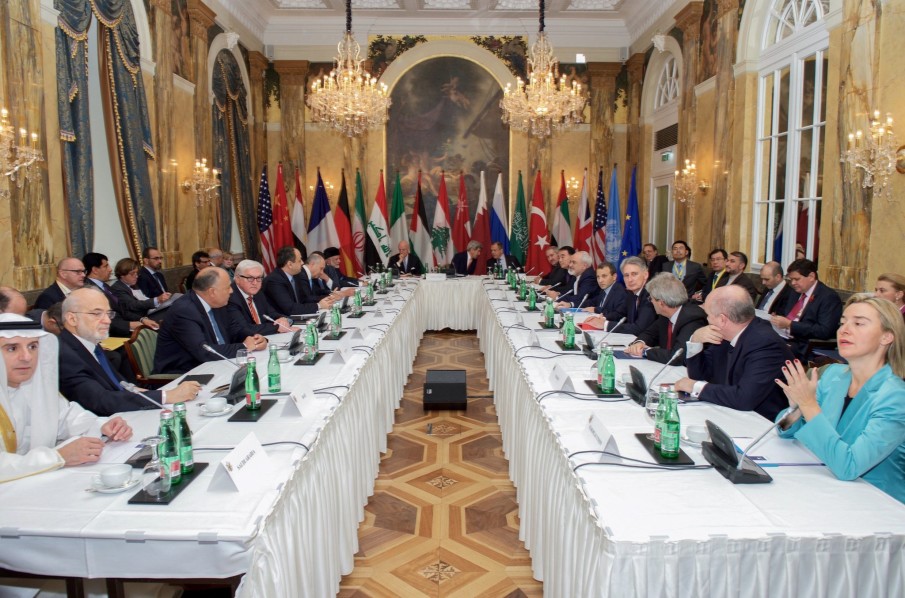As the fragile ceasefire in Syria continues, Russia has stated they will be pulling out their troops estimated at numbering over 4,000. Russian President Vladimir Putin has pressed to have his soldiers home by Monday, going on to say Russia’s mission to assist the Assad campaign to regain battlefield momentum has been accomplished. One can’t help but to envision the scene of flight suit-bedecked George W. Bush’s speech aboard what will forever be known as the USS “mission accomplished.”
And, as if on cue, al-Qaeda’s Syrian franchise, Jabhat al-Nusra, has pledged to launch a new offensive as Russian military forces pull back from previously held territories, focusing efforts to rip them back from the cold, retreating hands of yet another military of a major world power. Hmm…and the familiar hits just keep on coming.
However, this latest announcement provides Syrian opposition groups with renewed hope, as they believe a Russian withdrawal will pressure the Assad regime into reaching a deal during the latest peace talks in Geneva. The question remains, though, as to whether this withdrawal includes Russian air power, which has caused the deaths of hundreds of civilians and leveled several critically needed hospitals.
Another concern is the timing of this withdrawal and whether it is simply more useless political rhetoric bent on delay. According to a security analyst with the Levantine Group, Michael Horowitz, “If he [Putin] doesn’t mean the aerial component, and if the withdrawal takes months, this won’t mean anything.”
There does seem to be a silver lining for the Syrian opposition. Assad’s loss of Russian military power delivers a serious blow to the regime, and without the air cover and military might of their Ruskie friends, the odds of Assad retaining his authoritarian control is in considerable jeopardy.
However, Bashar Ja’afari, who is the Syrian government’s representative in the peace delegation, refuses any discussion or even a hint of having Assad step aside, stating, “President Assad has nothing to do with the talks.” During his first press conference, Ja’afari criticized the opposition’s refusal to conform to their own demand to fight terrorism, even charging them with harboring terrorists.
On the other end of the negotiating table, the High Negotiations Committee (HNC), otherwise known as the Syrian opposition, found no “common ground” after reading the paper submitted by the Syrian government to the UN special envoy, Staffan de Mistura. The HNC refuses to entertain any discussions that leave Assad in place, finding it “absolutely unacceptable.”
And in the midst of this finger-pointing and tire-spinning, the players on the world chessboard continue their posturing. Russia has continued to warn of their willingness at retaliation against those who breach the ceasefire. Turkey has ramped up their military buildup and have continued shelling around their borders with Syria. Now, with the recent bombings in Brussels and with such little progress being made in Geneva, time is quickly running out for peaceful resolutions.
Though extremely frustrated, de Mistura carefully but relentlessly presses both sides to proceed as quickly as possible. His biggest fear, and one shared by millions suffering in the area as well as the millions displaced around the world, is the powder keg of external pressures that may explode at any minute, completely derailing this tenuous ceasefire.
While the Western world awaits the outcome, safe in our homes watching reruns ahead of the “Game of Thrones” premiere next month, millions of men, women, and children await their lives’ fates, which rest on the outcome of these delicate discussions between men they’ve never heard of. Men who hold the power of death in the very ink of their pens. May God bless these many poor, wretched souls and the consequences that will follow the decisions of so few.
(Featured image courtesy of nytimes.com)
Already have an account? Sign In
Two ways to continue to read this article.
Subscribe
$1.99
every 4 weeks
- Unlimited access to all articles
- Support independent journalism
- Ad-free reading experience
Subscribe Now
Recurring Monthly. Cancel Anytime.











COMMENTS